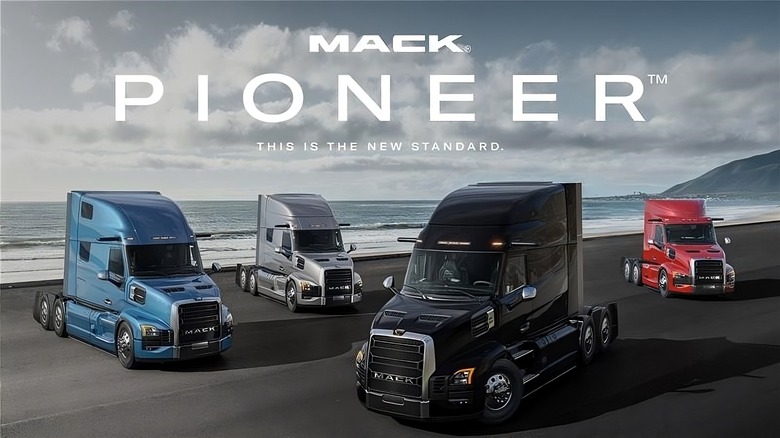Trump’s still sticking with the tariffs he promised and Republicans voted for, something every single person who already knew what a tariff was knew would end poorly. On the automotive side, these Republican tariffs are already keeping cars out of the U.S. and will soon raise prices on most of the vehicles you might want to buy. Now, we’re beginning to see yet another consequence of this disastrous policy. On Thursday, Mack Trucks announced plans to lay off several hundred workers, and the truck manufacturer specifically blamed the Republican tariffs, the Pennsylvania Capital-Star reports.
Between 250 and 350 workers at Mack’s Lehigh Valley Operations center near Allentown, Pennsylvania, will lose their jobs over the next 90 days. That’s not the only location that will see layoffs, though. FreightWaves reports an additional 50 to 100 workers at the Volvo subsidiary’s Hagerstown, Maryland factory will be out of work by May 2, adding to the 43 workers who were already laid off earlier this year.
In an email, a Mack Trucks spokesperson told FreightWaves:
Heavy-duty truck orders continue to be negatively affected by market uncertainty about freight rates and demand, possible regulatory changes, and the impact of tariffs. We regret having to take this action, but we need to align production with reduced demand for our vehicles. This is considered an indefinite layoff. We can’t say when we’ll need to increase production as it depends on the market, but we look forward to calling people back as soon as that’s necessary.
Horrible timing for Mack Trucks
In a press release, Pennsylvania State Representative Josh Siegel called the layoffs “a clear signal of the dangerous economic instability being fueled by the Trump administration’s chaotic tariff policies” and added, “The tariffs — erratic, broad and poorly targeted — are crushing core U.S. industries like trucking and manufacturing. Supply chains are snarled, costs are soaring, and confidence among employers is collapsing.”
It’s especially notable that Mack Trucks is already laying off workers since, less than two weeks ago, it revealed the new Mack Pioneer, a Class 8 truck that TTNews reports is the most aerodynamic and comfortable truck the company has ever built. Between the powertrain upgrades and more slippery shape, the Mack claims the Pioneer is 11% more efficient than its predecessor. At the reveal, Lukas Yates, Mack’s head of design, told the media:
This truck was designed for class-leading driver comfort and to maximize aerodynamic performance. Every detail, from the lowered fenders to the continuous surface from the front grille to the back of the sleeper box, was engineered to reduce drag and enhance fuel efficiency while maintaining the commanding presence for which Mack is known.
You’d think the launch of a new, more efficient model would have meant plenty of orders for Mack and plenty of work for its employees, but thanks to Republican trade policies, that’s not actually the case.
It isn’t just Mack
As FreightWaves reports, Mack isn’t the only trucking company that appears to be in trouble. The entire industry is. According to a report from analysts FTR Transportation Intelligence, Class 8 truck orders in March dropped 14% and were down 22% year-over-year. That was also before Trump formally kicked off his trade war earlier this month, so it’s probably safe to assume the trucking industry has seen orders drop even more drastically over the last several weeks.
“The implementation and continued threat of tariffs among North American trading partners combined with ongoing economic and freight market uncertainty have significantly dampened fleet investment in Class 8 trucks and tractors in recent months,” FTR said in its report.
It may only get worse from here, too. As gCaptain, a shipping industry news outlet, reports, despite having a strong Q1, the Port of Los Angeles and other U.S. ports are bracing themselves for a drastic drop in cargo arriving from overseas, as well as fewer exports. According to the latest Global Port Tracker report, a 19-month pattern of growth is expected to end, with May seeing a 20.5% drop in cargo volume. June isn’t expected to be any better, with volumes also expected to drop in July and August.
Without as many containers coming in, trucking companies won’t have as many goods to haul, which will be bad for new truck orders. It could be even worse for the truckers and mechanics, with layoffs rolling in and smaller trucking companies closing down. For example, Davis Express, a 160-truck carrier in Florida, just announced two days ago that it will close down this summer and will be letting 117 truck drivers, 35 office workers and 11 mechanics go in the coming months.




